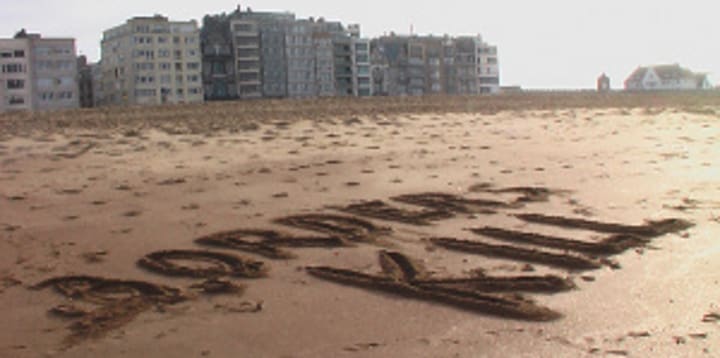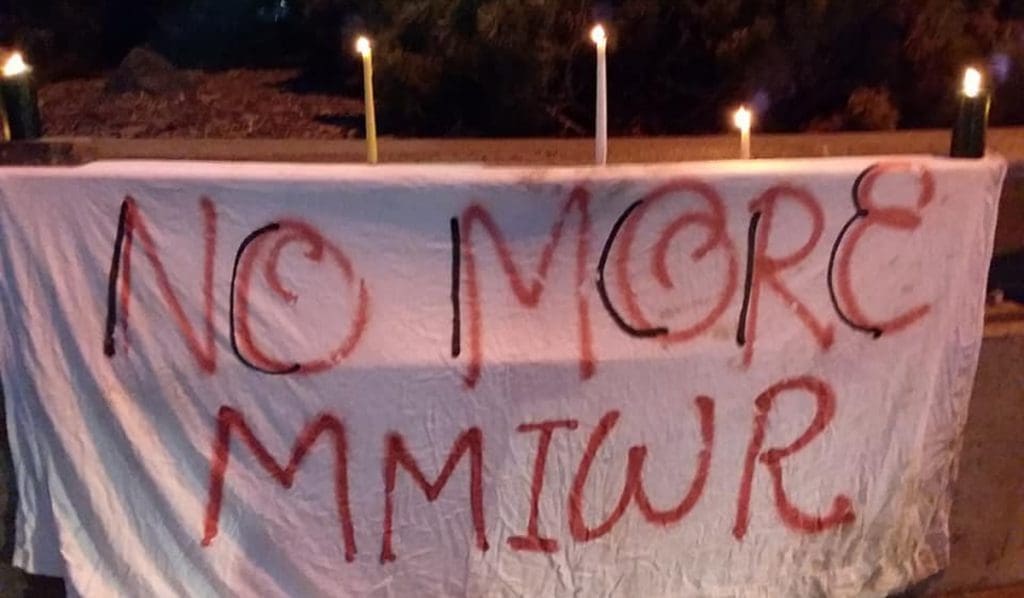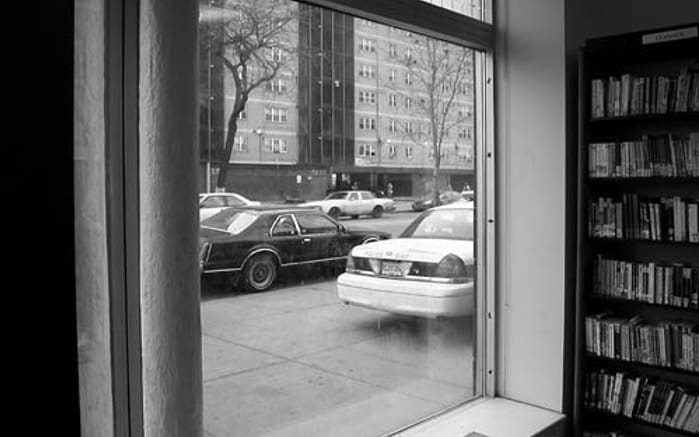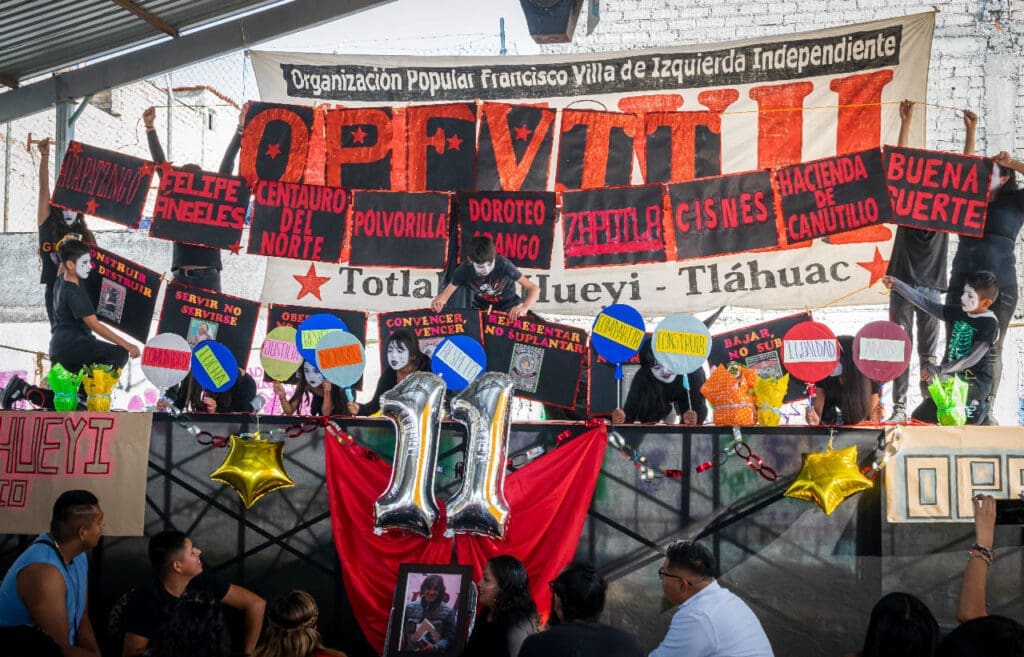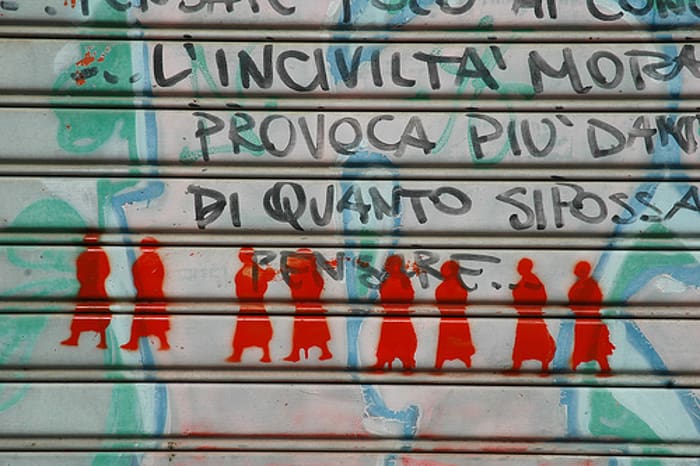By Antidote’s Laurent Moeri
(deutsche Originalpost hier einsehen)
The sun rides low on the horizon, soon to disappear behind the sea. In the ebbing light, scrabbly mountains discolor slowly in deepening shades of blue. A couple is sitting in a secluded cove, sand in their hair, gazing at the reddish-gold sinking orb. A few last fishing boats are returning to the small harbor. A fisherman begins to unload his catch; sitting, he slices open each fish and throws the offal in the water. Shrieking gulls arc above him, fighting over the glistening scraps.
The last rays of sun blink in the calm water. Tourists with reddened faces stroll through the little coastal town. A small, scrawny dog trails them shyly. The first windows brighten; behind them, tables begin to fill, glasses clink, dinner is served. Standing chalkboards in front of restaurants announce that here the menu is available in Swedish, there in French. The air smells like warm bread and grilling fish, with a hint of coconut sunscreen. The streetlights come on.
Some children are playing in the streets, running around the fountains, calling to their parents, laughing; other children walk with hopeful eyes through the same streets, trying to sell roses, handkerchiefs, or neon glowsticks. Parents are walking ahead, lingering at display menus and boutique windows. Amid it all, a street musician, a juggling Charlie Chaplin, and a human statue vie for the favor of passersby. The last edge of the sun’s crown disappears and twilight seeps across Crete, a little later Djerba, and the entire Mediterranean.
The first star glints to life over the town, followed quickly by the next. By and by, darkness expels the last remaining daylight. The yellow on the horizon first turns orange, then red, ever dimmer until it melts into the dusky rest of the sky. The heat begins to dissipate; slowly it takes its leave entirely. The sounds of the town, the harbor, and the cove lose their brilliance, as if draped with gauze. One brief, cool gust of wind meanders through and is gone.
Shop workers come home, kiss the kids, cook. Men sit in cafés, smoke, have a glass or two, play cards half swearing, half laughing, and go home. For a moment everything seems slower, gentler, quieter. Televisions come on, flickering through windowpanes…football.
Out in the cedars it is quiet. A campfire is started. The snapping of the flames calls people out of their improvised tents. New faces join the gathering; they tell of their adventures since fleeing—pain and fear give way to hopeful warmth for a moment, make room for dreams no one dares believe.
It smells like dust, like smoke. Some are packing worn clothing into bags, others lie exhausted on old mattresses laid out on the ground. Cigarettes are shared. Some will try, a little later, to climb the fence; others think about finding a bit of work in the morning. A man sits back against a tree, a piece of paper in his hands, a letter perhaps, and wipes his eyes.
In the dust and debris, a family sits on the floor. Oil lamps weakly illuminate the room. Rusted rebar reaches arthritically down from the ceiling, in which there is a massive hole. A soup pot simmers over a tiny gas flame. From out in the distance, a persistent wailing asserts itself into this cavern that used to be a home. It is the hungry children, who cannot fall asleep. Footsteps and shadows slither in and out; plastic bags catch in the wind and flutter through the air—the same air through which barrel-bombs judder all day long, making the earth tremble with their destructive fury. Forgotten by the world, the people hold hands.
The cold of night and its oppressive silence expand over Ankara and Homs, over Ceuta and the Mediterranean.
A patrol car moves through the narrow, dark streets. Closed shop shutters covered in graffiti and anarchy signs greet the unwelcome visitors. Music pulses from every crack and cleft of the neighborhood. Youths are sitting on park benches drinking beer. Homeless people arrange their bedding under an overpass. It smells like piss.
A bottle sails through the air, landing with a pop just in front of the police car. Several youths, laughing and shouting, take off down an alleyway. The patrol drives on; a bit later it stops again at a side street, observing. Cats picking through a metal dumpster catch sight of one another, hiss.
A young man is heading home. Walking down familiar streets, he passes people as they filter in and out of the bars. In front of one of these, a fire-spitter attracts a modest crowd. In an apartment across the way, a couple lies in bed, trying to make love quietly so as not to wake the baby. Up above, a woman is sitting on her balcony smoking a cigarette; she gazes into the night, mildly watching the activity on the street.
The young man turns into a quiet alley. The police car is blocking his path. Two officers climb out, cursing at him savagely. He tries to tear free of their grappling arms; he yells, and a group of youths from nearby hurries toward the alley to help. Suddenly there is a shot. Another. And a third. The young man falls to the ground, dying then and there.
Soldiers relieve one another’s posts; those at shift’s end head to their quarters, those reporting receive instructions. German shepherds are fed, patrols are formed. Spotlights grope, as if blindly, through the darkness. In a quiet moment one can hear the surf, how the propulsive mass of water abuses the coastline.
On the opposite coastline, refugees are gazing out over the same water, terrified, steeling themselves. Dogs howl in the distance. People wade tensely through the shallows in the moonlight; a father lifts his daughter into the small rubber raft. No one dares to speak. Fear is written on the little girl’s face. Over the sea shines the starry sky, the milky way alight. The boat sets off.
Fifteen minutes later the boat is engulfed in the dazzling cold of a spotlight. At first the people in the boat imagine they are saved; tension leaks away—the shining eyes of the little girl fill with hope.
The border patrol boat is nearer now, stunningly large. A rope ladder is thrown down; the first climb up. Then comes yelling, kicking, insults. The girl hides behind her father’s legs. He reaches an arm down, holds her to him. This raft will never reach its destination. It is hooked to the coast guard ship with a steel tow rope and moments later it is careening over the waves at astonishing speed. Tonight, seven people drown on the open ocean, among them the little girl.
A child is awakened by the thunder of military jets. No sirens blare. The first explosions, shaking the night to its spine, are the only warning. Flames leap up, lighting the sky, only to be dimmed by billowing black smoke. Another jet throws off its burden, then another. Another. The power goes out, then quiet. For a moment even silence. Then the ambulance sirens break the spell. Wounded are laid on stretchers. Doctors and nurses rush through the corridors of hospitals.
Somewhere the jets land, their mission complete. One minute drags the next behind it, stumbling; the night seems not to want to pass. More and more wounded are brought to the hospital; family members gather out front. A doctor is trying to resuscitate a child. Mothers are shrieking wildly; a father holds his palms skyward and heaves out a mixture of curses and prayers. A small boy is sitting on the curb, crying. First dawn soothes him slightly; he falls asleep in his father’s lap. Morning approaches in Gaza, on Lesbos, in Exarchia and across the Mediterranean.
On the large avenues, little by little the noise of traffic begins to condense. Motors hum. The first car horns, the squeaky brakes of buses at bus stops. The hectic city awakens to the smell of exhaust and coffee. In the side streets, vendors ready their wares for a day of business. From all around, the drone of machines. People are printing, cutting, cleaning, stacking, grinding, baking. Acquaintances greet one another on their way to work; a stranger quickens her step past a homeless man lying on the ground and hustles down into the Metro. The air starts getting thick, and along with the rising sun the heat reports for duty. Amid it all, outcasts are sifting through garbage, looking for anything worth anything, pushing shopping carts full of wood planks and windowpanes.
Still at home, a young man prepares his mobile market stand. He neatly stacks fruits and vegetables. His mother says good-bye with a kiss on the forehead, wishing him a successful day. The day has not even begun, and the young man is already sweating in the sun. He pulls the stand to the plaza and picks a spot near the city administration building. A first customer buys a couple oranges, exchanging smiles with him.
Then a policewoman approaches the stand; she asks to see the young man’s permit to sell here. The young man assures her that since it is a mobile stand he doesn’t need a permit. She doesn’t seem to listen. Instead, she calls over more police officers. They confiscate the young man’s cart, his scale, the whole stand, produce and all.
Beside himself with rage, the young man goes to the city administration building. He begs to see the governor, explaining the injustice that has been done him, emphasizing that he works to feed his family, to send his sisters to school, to put himself through school as well. Here again, his appeals fall on deaf ears; he is promptly refused an audience with the governor.
Instead, police officers reappear, arrest him, and take him to the nearest station. He is made to undress. Delighted at his shame, the officers laugh at him cruelly. An hour later, he is let go, with a cuff across the brow, by the very same policewoman who confiscated his stand not two hours before.
Furious, he walks determinedly to a gas station; with the money from the oranges he buys a canister of gasoline and heads back to the administration building. Cursing, visibly distraught, he empties the gas can over his head, shaking the last of its contents out with impatience and fury. A few moments later he is standing on the plaza engulfed in flames.
In an unremarkable fishing village crouched between bleating sheep on mountainsides and the roaring sea, an old dog limps along the narrow streets. On his way through the village he passes the venetian church, wades among a few dozen chickens on a small plaza, and finally lies down in the sun in front of a café.
It is a Sunday like any other. Some villagers are coming out of church, others from the sea. Around a table at the café sit people of all backgrounds and skin colors. An older villager reminisces, telling of a time when the town was collapsing, almost completely dead, a time when in the middle of the night 218 people—exhausted, half-frozen, half-starved—ran aground here. Back then most of the houses stood empty; the workshops, the bakery and the barbershop all closed. It was resolved, then, to take in the refugees without bureaucracy, without question, that they might take part in rebuilding the town.
And that’s what they did. Today there is once again a school, in which children and their parents arriving here first learn Italian. New arrivals are astonished when they hear of it. After so much political repression, after expulsion or escape, after agonizing flight, have they actually landed in a place where they are welcome?
A glance at the plaza reveals the answer is yes. Standing alongside the old villagers, they see African children playing football; together with the smell of fresh bread, Arabian music is wafting out of the old bakery. A young couple pushes a stroller leisurely across the square: the little one laughs out into the world, becoming herself the symbol of peace among cultures. In Riace, in Sidi Bouzid, in Greece and across the Mediterranean a new day is beginning; amid rough mountain faces and roaring flames a better world awakes.
A mother sends her son out to buy bread. After days of tumult, finally a kind of calm prevails. On the hotplate a covered soup pot is chattering absent-mindedly; the sun is shining through the blinds.
The boy sets out. The neighborhood is still in pieces, strewn with debris. Broken glass, splintered wood and loose cobblestones are mixed with other traces of the past few nights: empty teargas canisters and spent rubber bullets. Smoke is still rising here and there over the city, and the tang of teargas lingers in the air.
Two blocks down, masked police are standing in columns, stopping and searching passersby. The young man decides to take another way around; still, some yards later he comes upon another large police formation. He hears shouting from further down; a large group of people is approaching the police barricade. A street battle breaks out: stones fly and are answered swiftly.
The young man is turning to get away when he is struck on the back of the head with a teargas canister. Unconscious, he sinks to the ground. This young man is named Berkin Elvan, and nine months later he will die without having once awoken from the coma.
Tears blur my vision on this day. The view of that better world—the one being born in timid fits and starts—is aswim. Somewhere a young woman is grieving the loss of her brother, her mother, her sister, her father. Countless tears slip down her face and fall to the ground; finally she falls asleep.
In a dream she sees it. She sees how slaves throw off their chains and rise, unafraid. She sees how the damned revolt against state force, how they storm the palaces, how Erdogan is hanged, Assad shot, Lagarde beheaded.
All around the Mediterranean people are hearing the call. In their rage and indignation and in their grief, they assemble on city squares, they defend their lives and livelihoods, and they won’t be made to leave.
The true face of the oppressors is showing itself. Their indifference to human existence can no longer be overlooked. In order to stay in power, they will murder children. But from Tahrir to Gezi, from Syntagma to Puerto del Sol, the sleeping are stirring awake, and stirring the ashes of rebellion. The darkness of night will no longer fall—it will be chased off by passion, by the shining light of those fighting back.
Out on the sea, fishermen make their slow rounds. From their boats, still in darkness, they see all around, on every horizon, the coasts of the Mediterranean in flames.
Written in remembrance of the children who, for all of our striving for freedom and justice, for all our craving for respect for our existence, have been murdered by the police and the military, by officers and presidents. Whether we know these children’s names or not, whether in Syria, Turkey, or Greece, we owe it to them never in our lifetimes to forget, and never to forgive.
Translated by Antidote
Image source: Calais Migrant Solidarity

